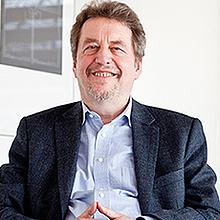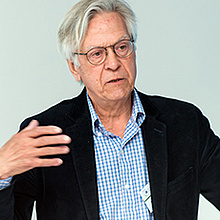Jump to the content
- {{#headlines}}
- {{title}} {{/headlines}}

Contact
Teresa Havlicek
Press, Communications and Marketing
Phone: +49 228 833-423/257
Fax: +49 228 833-441
presse[at]avh.de
Georg Scholl
Head of
Press, Communications and Marketing
Phone: +49 228 833-258
Fax: +49 228 833-441
presse[at]avh.de
Hans Joas and Bryan S. Turner
Religion and Modernity: Secularisation and Social and Religious Pluralism

Tension often arises between religion and modernity where non-believers and the religiously minded perceive one another uncomprehendingly, if not even antagonistically, as do the followers of different faiths. Hans Joas does not look at the divides but instead seeks common ground.
A key approach that he has developed to tackle the issue is a graduated model which enables religious experiential patterns to be interpreted and described. Joas believes the starting point for all religious experience is self-transcendence. Here he is referring to the psychological description of a phenomenon that all adults have probably experienced during their lifetimes – for example, a sense of being at one with nature by the sea, on a mountain peak or deep in the forest. Joas also puts falling in love into this category, as well as experiencing the death of someone close. As the experiences of self-transcendence evoke a general consciousness, Joas establishes a basis for a reciprocal understanding between believers and non-believers.
Religious belief nevertheless goes far beyond the experience of self-transcendence. Believers interpret this differently and through it can experience what Joas refers to as "sacramental experience", which is the second level in his model. Joas once explained this very vividly in an interview using the example of prayer: "We know that many non-believers have a slight tendency to pray occasionally. However, for believers who really presume that a divine being exists as a counterpart, receiving an answer is a possibility. In this respect, faith extends people’s possible range of experiences."
Transcendence in the religious sense finally comes into play in the third level of the model. Transcendence means that God, the gods or the divine principle are not simply part of the human universe, its knowledge and experiential spectrum but are instead above them. As it also says in the bible, this suggests: "My kingdom is not of this world." The notion of transcendence emerged in antiquity during the "Axial Age" between 800 and 200 B.C. in which the major world religions, such as Christianity, Islam, Hinduism and Buddhism, have their origins. Joas sees transcendence as a "profound common trait" between world faiths that enables peaceful dialogue.
Hans Joas is nonetheless far too much of a realist to believe that his model could provide the solution to the current religiously charged conflicts. As he emphasizes, political Islamism can certainly not be understood purely from a socio-religious perspective. Instead, the entire nexus of historical, political and military factors have to be taken into account. The future, underscored Joas in the interview, is less dependent upon interreligious dialogue than political decisions.
Hans Joas recently attracted great attention with another approach where he again combines religion and modernity. This concerns human rights, their origins and therefore also their universal validity. The origins of human rights were previously usually attributed to the Enlightenment and the Christian tradition. As a result, human rights are quickly labelled as being "Western"; this makes it easy to contend that they are not applicable in other cultures.
Joas puts forward an entirely new explanation of their derivation. He argues that human rights emerged during the 18th century as a result of cultural change, namely the notion of the sacralization of human beings. The view that each individual is unique and therefore, to some extent, holy in light of their individuality, has gradually gained acceptance. Joas illustrates through this approach that human rights function like religious doctrines in the secularized countries of Europe. Joas believes the basis of this sacralization is found long before Christ: in ancient philosophy and the bible but also in other cultural environments, such as in Buddhism in India or Confucianism in China.

Bryan S. Turner has addressed a wide range of issues including Islam, the relationships between religion and politics and the sociology of human rights. For this reason, he is regarded worldwide as one of the leading sociologists of religion of our time.
In 1974 he began establishing Islam as a topic of sociological analysis at a time when this major world religion received little academic attention. He has since continually analysed Muslim faiths incorporating various other factors, such as capitalism, orientalism, modernity, gender and civil society.
Whereas religions played an insignificant role in the late 20th century, the situation changed abruptly after the attacks of 11 September 2001. Turner’s analyses were suddenly much in demand. "This was one of those events to which the expression ‘nothing is the way it was before’ genuinely applied," says the sociologist explaining his perceptions of 9/11. "Public attention now focuses on all religions and they are creating a new political climate that can seem menacing. It nevertheless also opens up new opportunities for the development of civil society."
Besides establishing Islam as a new research field, Bryan S. Turner has also made a lasting impact on the sociology of religion as a whole. His reintroduction of the significance of the body in the analysis of religions is of fundamental importance here. The understanding of this was previously heavily influenced by Protestantism, which solely characterizes religion on the basis of values, norms and culture. In contrast, Turner has identified the corporeality of religious ceremonies and practices, and successfully introduced this concept into social science debate. Especially against the backdrop of religious conflicts, this perspective on corporeality today plays a highly significant role in understanding religiously motivated propensities towards violence.
Bryan S. Turner also deals with the relationships between religion, modernity and secularization, as well as the social consequences of these processes. Here he primarily looks at how social cohesion changes when religion is eliminated as a binding element and society becomes increasingly pluralistic. His observations suggest that this raises completely new questions on many supposedly self-evident matters, such as socio-political measures.
In light of religious, social and cultural pluralization, Turner’s analysis focuses on how social order can be ensured. Turner provides the answer in his "legal pluralism" concept: He attaches great importance to law as a key and decisive institution in modern societies, especially civil and human rights. Turner’s interpretation of corporeality once again comes to the fore in this line of argument. He regards the vulnerability of the human body as the ultimate justification for the validity of human rights, as all humans are corporeal beings upon whom suffering can be inflicted. On this basis, Bryan S. Turner finds a perspective for the peaceful coexistence of different religions and denominations.
Further information
- Max Planck Research Award Winners 2016
- Max Planck Research Award Winners 2015
- Max Planck Research Award Winners 2014
- Max Planck Research Award Winners 2013
- Max Planck Research Award Winners 2012
- Max Planck Research Award Winners 2011
- Max Planck Research Award Winners 2010
- Max Planck Research Award Winners 2009
- Max Planck Research Award Winners 2008
- Max Planck Research Award Winners 2007
- Max Planck Research Award Winners 2006
- Max Planck Research Award Winners 2005
- Max Planck Research Award Winners 2004
